The SINFONIA Course 5 on Radiation Risk Appraisal in Nuclear Medicine was held in Warsaw/Poland on 2-5 October 2023. It was hosted by the SINFONIA consortium members NCBJ, and attended by 14 participants.
The course aimed to acquaint participants with the state of the art on radiation protection requirements and regulatory status as well as radiation risk appraisal related to nuclear medicine procedures. The course contained both lectures and practical laboratory work in one of the leading Nuclear Medicine departments in Poland, at the Maria Sklodowska-Curie National Research Institute of Oncology in Warsaw.
The course programme can be downloaded here.
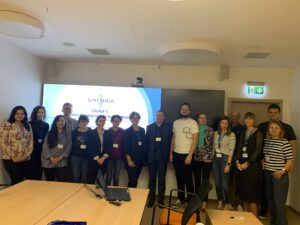
Fig. 1. Course 5 has officially started.
On day 1 the course provided introductory lectures on the SINFONIA project and the requirements for radiological safety, followed by information on the quality requirements for radiopharmaceuticals and their pre-clinical evaluation, provided by Renata Mikolajczak, Krzysztof Krol, and Piotr Garnuszek from NCB.
Day 2 was oriented on dosimetry for diagnostic radioisotopes and dosimetry-guided personalized radionuclide therapy, with the lectures provided by Monika Tulik from Warsaw Medical University, and Agata Sackiewicz and Wioletta Chalewska from the Maria Sklodowska-Curie National Research Institute of Oncology.
Lectures were continued on Day 4 with the topic of production of medical radioisotopes and radiopharmaceuticals in hospital radiopharmacy and lectures on the current status and future trends in diagnostics and therapy in nuclear medicine and dosimetry for personalized radionuclide therapy from clinical perspective, given by Jolanta Kunikowska from Warsaw Medical University, past president of the European Association of Nuclear Medicine.
The practical part of Course 5 focused on classical laboratory techniques and measures used at the hospital performing nuclear medicine procedures from the preparation and handling of radiopharmaceuticals through the radiopharmaceutical administration, patient personal dosimetry using various software, and the assessment of the risk for personnel and carers. Altogether 4 half-day sessions were dedicated to practical training. The opportunity for hands-on training and exchange of information with experienced personnel of the hosting laboratory was an important component of Course 5.
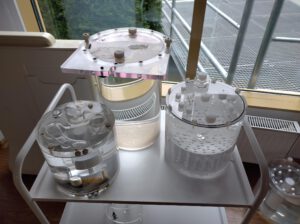
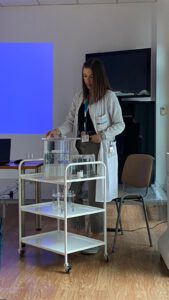
Fig. 2. Phantoms used for dosimetry studies at the Maria Sklodowska-Curie National Research Institute of Oncology and Wioletta Chalewska presenting their features.
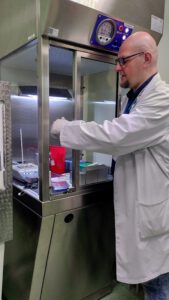
Fig. 3. Procedures in hospital Radiopharmacy – demonstrated by Pawel Ochman.
Despite the cold weather, the participants enjoyed the visit to the town of Warsaw and the walk in the beautiful Lazienki Park.
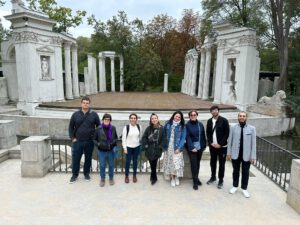
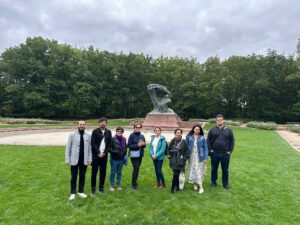
Fig. 4. At the amphitheater and in front of the Frederic Chopin statue at the Lazienki park.
Course 5 was wrapped up with a small certificate award ceremony. It also resulted in many new networking activities. We would like to thank our participants for their active contributions to the course and all the lecturers for their willingness to share their knowledge. In particular, we address our gratitude to the team of the Nuclear Medicine department at the Maria Sklodowska-Curie National Research Institute of Oncology and its head, Marek Dedecjus, for hosting the course. We are looking forward to the next opportunities to working together.
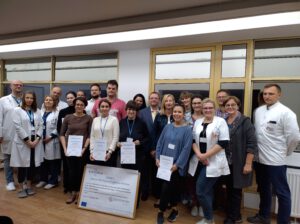
Fig. 5. Before going back home – satisfied participants and organisers of Course 5.
Eva-Alexandra Salvanou, PhD (Radiochemical Studies Laboratory, INRASTES, NCSR “Demokritos”, Athens) attended Course 5 and provided a nice report too:
“The course was well-structured and covered many aspects of the nuclear medicine procedures, starting from legislation up to clinical practice. To begin with, the fact that the whole course was performed in an oncology hospital where each and every procedure described could take place, under real circumstances and not just in theory, was something very exciting for me. The practical training sessions were a great opportunity as one could see all the procedures concerning radiopharmaceuticals from the elution of a generator, QC, preparation of patients for imaging, equipment, even waste management. Ms Paulina Cegla was always very pleasant and helpful. Additionally, practical sessions with Mr Pawel Ochman were very detailed and interesting. Another important parameter is that the lectures/practical sessions were very well organized which meant that we had time for questions and discussion. Every day we finished in time and did not have long and exhausting days that are tiring for both participants and organizers. Also, the meals provided were very nice with a lot of options for every taste. All lectures were very interesting and especially on the last day lectures from Prof. Jolanta Kunikowska were extremely useful giving us a spherical and clinical perspective on nuclear medicine. Finally, I ought to mention that organizers were always there for us, especially Prof. Renata Mikolajczak who also organized a wonderful tour for us in beautiful Warsaw; a very kind and much appreciated gesture. Overall, it was a very useful course and I sincerely hope more such training courses will be organized so that young researchers will be given the unique opportunity to participate.”